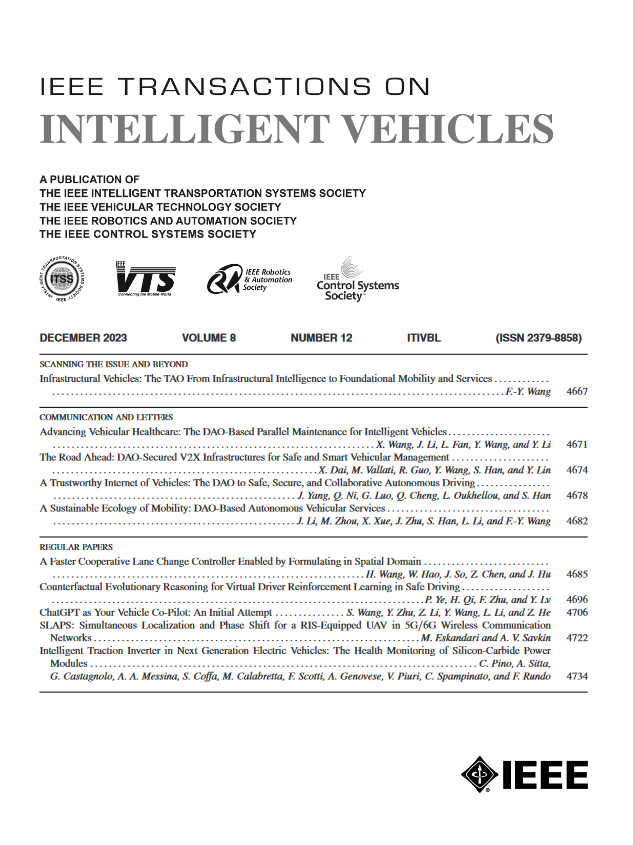Reservation-Prioritization-Based Mixed-Traffic Cooperative Control at Unsignalized Intersections
IF 14
1区 工程技术
Q1 COMPUTER SCIENCE, ARTIFICIAL INTELLIGENCE
引用次数: 0
Abstract
Connected and Autonomous Vehicle (CAV) has attracted much attention as it provides promising solutions to improve traffic performance in many scenarios, especially unsignalized intersections. However, as for unsignalized intersections where both CAV and Human-driven Vehicle (HDV) exist, to reduce the impact of HDV uncertain behaviors, existing related research tend to simplify the scenario or HDV behavior characteristics at unsignalized intersections, or ensuring passing safety without collaborative decision-making on traffic efficiency optimizations. To address these problems, this paper presents a method of reservation-prioritization-based mixed-traffic cooperative control at unsignalized intersections. Firstly, reservation rights of CAVs are prioritized by solving minimization problems, to optimize the reservation order of CAV on the behalf of traffic efficiency. Secondly, a reservation and speed planning mechanism considering HDV behaviors is designed, which develops and re-decides CAV's reservation result based on HDV free-driving behavior, and plans speed for CAVs based on their reservation results by solving constrained nonlinear programming problems. The proposed method is evaluated under different traffic volumes and CAV penetration rates on SUMO platform. Results show that the proposed reservation-prioritization-based method gains higher intersection throughput and averaged velocity under all scenarios, including a maximum throughput improvement rate of 17.77% and a maximum averaged velocity improvement rate of 66.37% compared with the comparative methods.无信号交叉口基于预约优先的混合交通协同控制
车联网和自动驾驶汽车(CAV)为改善许多场景下的交通性能提供了前景广阔的解决方案,尤其是在无信号交叉路口,因此备受关注。然而,对于同时存在 CAV 和人类驾驶车辆(HDV)的无信号交叉口,为了减少 HDV 不确定行为的影响,现有的相关研究倾向于简化无信号交叉口的场景或 HDV 行为特征,或者在确保通行安全的前提下,不对交通效率优化进行协同决策。针对这些问题,本文提出了一种基于预约优先的无信号交叉口混合交通协同控制方法。首先,通过求解最小化问题对 CAV 的预约权进行优先排序,以交通效率为导向优化 CAV 的预约顺序。其次,设计了一种考虑 HDV 行为的预约和速度规划机制,该机制根据 HDV 的自由驾驶行为制定和重新决定 CAV 的预约结果,并通过求解约束非线性编程问题,根据 CAV 的预约结果为其规划速度。在 SUMO 平台上,对不同交通流量和 CAV 渗透率下的拟议方法进行了评估。结果表明,在所有场景下,基于预约优先的方法都能获得更高的交叉口吞吐量和平均速度,与其他方法相比,吞吐量最大提高了 17.77%,平均速度最大提高了 66.37%。
本文章由计算机程序翻译,如有差异,请以英文原文为准。
求助全文
约1分钟内获得全文
求助全文
来源期刊

IEEE Transactions on Intelligent Vehicles
Mathematics-Control and Optimization
CiteScore
12.10
自引率
13.40%
发文量
177
期刊介绍:
The IEEE Transactions on Intelligent Vehicles (T-IV) is a premier platform for publishing peer-reviewed articles that present innovative research concepts, application results, significant theoretical findings, and application case studies in the field of intelligent vehicles. With a particular emphasis on automated vehicles within roadway environments, T-IV aims to raise awareness of pressing research and application challenges.
Our focus is on providing critical information to the intelligent vehicle community, serving as a dissemination vehicle for IEEE ITS Society members and others interested in learning about the state-of-the-art developments and progress in research and applications related to intelligent vehicles. Join us in advancing knowledge and innovation in this dynamic field.
 求助内容:
求助内容: 应助结果提醒方式:
应助结果提醒方式:


